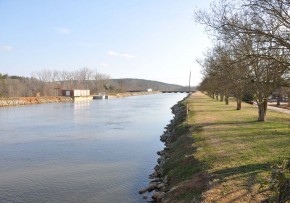
The mill is gone and the high school is no more, but that doesn’t mean Lockhart’s future can’t be bright.
“It is your destiny to control,” Ben Muldrow told people gathered at Lockhart First Baptist Church last Thursday night.
Muldrow, who specializes in branding and marketing for Arnett Muldrow and Associates in Greenville, was part of a 10-member team hired by the town to conduct a three-day planning workshop culminating in a final presentation. The workshop was conducted by Community Design Solutions of Columbia and funded through a $60,000 Rural Business Enterprise Grant from the USDA.
Thursday night’s presentation focused on specific recommendations to help guide Lockhart’s revitalization and stimulate economic growth. Although there is no local demand to recruit additional retail businesses to Lockhart, opportunities exist in several areas, including grocery (produce, meat and perishables), outdoor (campground, outfitter) and services (lawn care, home and auto repair), said Tee Coker, a market analyst with Arnett Muldrow and Associates.
“The community must take the initiative,” he said. “Lockhart must be willing to accept some degree of change if it is to survive as a viable community.”
The key ingredient to Lockhart’s future is the Broad River, planners said. The river is always moving forward; the community must make sure Lockhart keeps moving forward, they said.
“Lockhart was built on a river; it’s always been your source of power,” said Muldrow. “It’s time for us to go back to the river and help us evolve to the next phase.”
One suggestion was for the town to establish a trail network to link its resources, including the river, the canal and Jacob’s Well. Although the water from the canal is used to power the hydroelectric dam, perhaps the town could work with Lockhart Power Co. to find ways to utilize it for recreational purposes.
The Broad River provides Lockhart with an easy connection to the Palmetto Trail and access to over 400,000 people and translates to a positive economic impact, Muldrow said.
For example, the average canoer/kayaker spends $65-$100 per day pursuing their hobby, he said. Birders spend $78 per day and fishermen spend $55-$132 per day. Heritage tourists spend 33 percent to 36 percent more, he added.
“You have the potential to draw people who love the assets you have,” he said. “You owe it to yourself to tell your own story.”
Gateway signage is important for Lockhart because it directs visitors to specific locations, planners said.
Tom McGilloway, an urban planner from Baltimore, Md., suggested that the town place way-finding signs at intersections along with banners on light poles. Crosswalks could also be painted at intersections, he said.
McGilloway suggested that the town plant a few large canopy trees like oaks instead of many smaller, flowering trees, because they provide more shade.
Lockhart could join Tree City USA, said Jimmy Walters with the S.C. Forestry Commission. The program only requires the town to create a tree board or department, approve a tree care ordinance to protect publicly owned trees, establish a community tree care program and hold an annual Arbor Day observance.
Lockhart’s downtown area was the topic of more recommendations.
The team suggested crosswalks, directional signs, banners and trees around the parking lot in the middle of town. Any structures that are built should be oriented to the street; parking is not the dominant element.
One suggestion was to convert the old gas station into a paddle shop, where canoes and kayaks can be rented and fishing tackle purchased.
Four areas where the team concentrated its focus were the “Stack and Shoals” – where Lockhart Mill was located; Jacob’s Well; the Armory Landing; and the “The Retreat” – the large house on the hill.
The “Stack and Shoals” could be the site of primitive camping, footpaths, a park and even a possible outfitter and restaurant. Jacob’s Well could add some outdoor recreation to the property as well as a community garden. The Armory could provide adult education and after school care – children could walk down the sidewalks from Lockhart School. The Retreat could be a bed and breakfast, a hunt camp or even an executive retreat.
Afterwards, John Montgomery with Pacolet Milliken, the parent company of Lockhart Power Co., said the Lockhart community must continue to embrace the Broad River.
“I will make my commitment that we will do whatever we can to make this valuable asset available to you,” he said.
By Graham Williams, Staff Reporter with Union County News

 (803) 327-9041
(803) 327-9041
